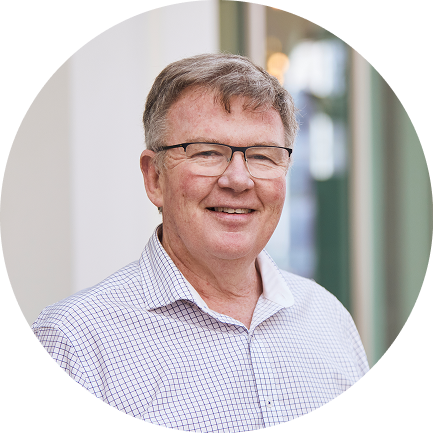THE YEAR IN REVIEW
Outstanding research ideas are the basis for the work that we do to improve outcomes for patients with breast cancer. The genesis and lifecycle of a clinical trial from that first concept through to implementation of findings is an often long, but very rewarding process. A new trial not only requires a good understanding of current best practice, but a certain ability to predict the future. Over the last year we have seen activity across the spectrum of the clinical trials landscape.
The work of Breast Cancer Trials (BCT) has been presented at international conferences, including a last minute late breaking abstract for PATINA at the San Antonio Breast Cancer Symposium. The data report was only received three days prior to the abstract presentation by Otto Metzger from Dana-Farber Cancer Institute. This study demonstrated an impressive 15-month progression-free survival benefit when palbociclib was added to maintenance first-line trastuzumab and pertuzumab. Patients with metastatic hormone-receptor positive HER2-positive breast cancer were randomised after their induction chemotherapy. This was one of the pivotal presentations from that meeting and has practice-changing implications internationally.
International collaborations continue to be fruitful. The Canadian-led FINER trial, investigating ipatasertib for metastatic breast cancer, completed full recruitment and underwent primary analysis working towards presentation and publication. Initial discussions are underway about another Canadian study called ROSALIE, investigating whether radiotherapy can be omitted after pathological complete response to neoadjuvant chemotherapy for early breast cancer.
The BCT portfolio of recruiting trials that were open during the reporting period remains active and diverse. BRCA-P, to prevent BCRA1-associated breast cancer using denosumab, closed to recruitment, with BCT making a major contribution to the sample size. Whilst it did not reach the target and was closed due to slow recruitment, there is an active translational program and ongoing work that will obtain meaningful new knowledge. The EXPERT trial steadily progressed towards the recruitment target, surpassing 90% with the support of both local and international sites. PROSPECTIVE was on the cusp of activation at the time of writing, after a lot of work from investigators and the operations office. This BCT-led international trial aims to validate the findings from PROSPECT, that patients can be selected for omission of adjuvant radiotherapy after pre-operative MRI and breast conserving surgery.
Neo-N Cohort C opened, investigating neoadjuvant nivolumab/relatlimab immunotherapy with abbreviated chemotherapy for triple negative stage I-II breast cancer. This follows on from successful results from cohort A and B, which was published in The Lancet Oncology. Another neoadjuvant trial called OLIO opened, for young patients with hormone receptor positive breast cancer undergoing neoadjuvant chemotherapy. This trial initially tests for a homologous recombination deficiency to determine eligibility, as that is hypothesised to sensitise the tumour to a PARP inhibitor with or without durvalumab.
In the early-stage post-operative setting, OPTIMA recruited well. This trial has the largest number of sites of any BCT trial in our history. We hope that this will show that we can use the Prosigna PAM50 test to determine which patients with intermediate to high-risk early breast cancer can safely avoid chemotherapy. The phase III CAMBRIA-2 trial opened, with slow recruitment initially, that has escalated in early 2025 in parallel with strong recruitment internationally. This will test the role of camizestrant compared with standard endocrine therapies in intermediate to high-risk early stage breast cancer.
For patients with metastatic disease and a circulating tumour DNA PIK3CA mutation, CAPTURE closed to recruitment and follow-up continues. The TUGETHER trial aims to find out if the combination of tucatinib, pembrolizumab and trastuzumab is safe and effective for patients with HER2-positive pre-treated metastatic breast cancer.
In the operations office we have had the support of two Fellows to work on a range of projects in the trials program. This includes medical review of data, SAE review, and work to facilitate the effective and efficient running of individual trials. A remote central trial screening project aims to improve recruitment to trials that require pre-screening tests for eligibility, using the OLIO trial as a test case. A Consumer-initiated project is being worked up with the help of one of the Fellows.
The Scientific Advisory Committee (SAC) met four times, with robust discussions around a variety of trial concepts, including those presented at the Annual Scientific Meeting Concept Development Workshop. Several grant applications were submitted to fund these trials, as funding appears to be an increasing challenge in research globally. The Very Early Breast Cancer subgroup was established, with the aim of bringing together a multidisciplinary group to work on concepts related to the earliest stages of breast cancer. The Systemic Therapy Subgroup was also established, to facilitate ideas and new trials of systemic agents. Both of these subgroups report to the SAC.
We are looking forward to the year ahead. The Annual Scientific Meeting program will be busy, productive and intellectually stimulating. We look forward to hearing new ideas for breast cancer research throughout the year, including from the ASM Concept Development Workshop, as these are the foundation for BCT’s existence. Working with a diverse range of the best and brightest breast cancer researchers throughout Australia, New Zealand and the rest of the world is an inspiring experience!

Dr Nick Zdenkowski
Chair of the BCT Scientific Advisory Committee

Professor Bruce Mann
BCT Director of Research
